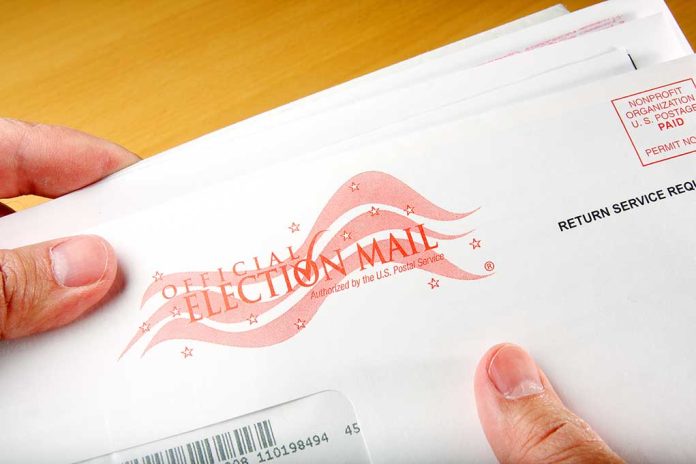
Pennsylvania’s Supreme Court has ruled that undated mail-in ballots are invalid in the ongoing U.S. Senate race recount, dealing a blow to Democratic hopes and reinforcing Republican demands for stricter election integrity measures.
At a Glance
- Pennsylvania Supreme Court rules against counting undated and misdated mail ballots in Senate race recount
- Decision affects all 67 counties, reversing previous actions by Philadelphia, Montgomery, and Bucks counties
- Ruling comes amid automatic recount in close race between Republican Dave McCormick and Democrat Bob Casey
- Republican National Committee celebrates decision as victory for election integrity
Court Upholds Election Code, Rebukes Counties
In a significant ruling that could impact the outcome of Pennsylvania’s closely watched U.S. Senate race, the state’s Supreme Court has ordered counties to exclude undated and misdated mail-in ballots from their vote tallies. This decision, reached by a 4-3 vote, directly challenges the actions of several Democratic counties that had been counting these disputed ballots despite previous court rulings against the practice.
The court’s ruling is particularly crucial as it comes during an automatic recount triggered by the narrow margin between Republican candidate Dave McCormick and incumbent Democrat Bob Casey. McCormick has been declared the winner by several media outlets but his lead has shrunk to less than 18,000 votes. The decision underscores the ongoing legal battles surrounding mail-in voting and election procedures that have intensified since the 2020 election.
Pennsylvania’s Supreme Court ordered counties not to count mail-in ballots that lack a correct handwritten date on the return envelope as the vote counting continues in the Senate election between Bob Casey and David McCormick. https://t.co/DvrNIzTokS
— CBS Philadelphia (@CBSPhiladelphia) November 18, 2024
Justices Emphasize Rule of Law
In a forceful concurring opinion, Justice David Wecht emphasized the importance of adherence to court orders, sending a clear message to local election officials who had chosen to interpret the law differently.
“It is critical to the rule of law that individual counties and municipalities and their elected and appointed officials, like any other parties, obey orders of this Court,” wrote Wecht.
Justice Kevin Brobson, joined by Justices Wecht and Mundy, further reinforced this stance, directly addressing local election officials who had taken it upon themselves to disregard parts of the Election Code they deemed unconstitutional. “I write separately to disabuse local elections officials of the notion that they have the authority to ignore Election Code provisions that they believe are unconstitutional,” wrote Brobson. This rebuke highlights the court’s determination to maintain the separation of powers and prevent unilateral actions by election officials.
Pennsylvania Supreme Court rebukes Democratic election officials who counted undated mail ballots https://t.co/8WkOuafgCM
— The Hill (@thehill) November 18, 2024
Republican Victory, Democratic Disappointment
The Republican National Committee (RNC) hailed the court’s decision as a triumph for election integrity. RNC Chair Michael Whatley declared the ruling left “no more excuses” for election officials to count ballots that do not comply with state law.
“No more excuses. Election officials in Bucks, Montgomery, Philadelphia, and other counties have absolutely no choice but to reject illegal ballots. We will hold them to it.”
On the other side, Democrats and voting rights advocates expressed disappointment with the ruling. Philadelphia City Commissioner Lisa Deeley voiced concerns about potential voter disenfranchisement and indicated that the fight over the constitutionality of the dating requirement is far from over.
Implications for Future Elections
This ruling sets a precedent that could shape how future elections are conducted in Pennsylvania. It reinforces the strict interpretation of the state’s Election Code and may influence how mail-in voting is handled in upcoming elections.
As the recount continues, with results expected by November 27, the impact of this decision on the final outcome of the Senate race remains to be seen. What is clear, however, is that the battle over election procedures in Pennsylvania—and likely in other battleground states—will continue to be a contentious issue in American politics.






















